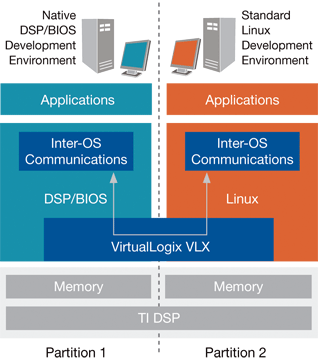Virtualization demo’d for QoS, security
Feb 8, 2008 — by Eric Brown — from the LinuxDevices Archive — 1 views [Updated Feb. 11] — VirtualLogix says its nanokernel can improve quality-of-service in VoIP applications. The vendor plans to demonstrate a Nokia web tablet running Linux and a VoIP softphone “appliance” on the VLX virtualization layer at the GSMA Mobile World Congress in Barcelona… next week.
[Updated Feb. 11] — VirtualLogix says its nanokernel can improve quality-of-service in VoIP applications. The vendor plans to demonstrate a Nokia web tablet running Linux and a VoIP softphone “appliance” on the VLX virtualization layer at the GSMA Mobile World Congress in Barcelona… next week.
(Click for larger view of N800 running Skype)
The demo will be among several at VirtualLogix's booth, the company said. In an interview, VP of marketing Mark Milligan commented, “Pretty much all our demos will run Linux.”
Several of the demos will integrate Linux running with a separate virtualized real-time operating system (RTOS) on single and multicore processors. “The idea is how do you take advantage of Linux while still using some capabilities around RTOS?”
VirtualLogix will demonstrate one such a solution on a Linux-based Nokia N800. “We're showing how you can have Linux do the user interface while placing secure applications — what we call virtual appliances — in separate partitions outside the OS,” said Milligan. “For example, on the Nokia N800 platform, we're demonstrating fault tolerance in virtual appliances with both a secure firewall and VoIP. Despite any corruption that might occur in the open OS, the quality of service and security will remain protected.”
Due to its open nature, the N800 and other Nokia web tablets are often seen at tradeshows running exotic Linux stacks, such as Qtopia, Poky, Wind River, and so on. A company spokesperson said VirtualLogix's N800 demo is merely a demo, and denied that VirtualLogix will supply the VLX stack to Nokia for use in forthcoming WiMax-enabled versions of the tablet.
VLX comprises a small scheduler and other nanokernel components designed to divvy up a computer system's physical hardware resources between multiple operating system instances. Thus, the nanokernel can provide privileged access to the WiMax interface for a VoIP client running on a separate RTOS, or in VLX's minimalist POSIX execution environment.
In another demo, VirtualLogix plans to show a proof of concept handset based on the multimedia-friendly Freescale i.MX31 system-on-chip (SoC). “Here, we're demonstrating the idea of using secure platform agents running a simulated M-commerce server in a separate partition, with secure keys and authentication,” said Milligan. “At the same time you also have Linux to give you the full user interface, web browsers, and other applications in an open OS.”

VirtualLogix VLX-NI for DSPs supports normal DSP/BIOS and Linux dev tools
VirtualLogix will also be demonstrating ATCA-blade networking technology based on its collaboration with new investor Texas Instruments (TI) on a version of VLX-NI (Network Infrastructure) optimized for TI's digital signal processors (DSPs).
“The demo shows the DSP running an EDGE wireless access platform, and everything is running on the TI BIOS, which we are virtualizing,” said Milligan. “We switch back and forth between running functions on the DSP BIOS and then switching to Linux to do functionality such as logging. It shows that you don't need a separate control processor.”
Finally, the company will demonstrate a reference design from Philips spin-off NXP Semiconductors and French mobile Linux phone stack firm Purple Labs. The companies have teamed up on a sub-$100 3G phone hardware/software reference design called Purple Magic (pictured at top). The Linux-based design uses VirtualLogix's VLX-MH (mobile handset) version to simultaneously run Linux and a telecom RTOS on a single ARM9 core. Recently, Azingo Mobile also announced it was developing a Linux mobile phone design using the same NXP Nexperia 7210 chipset, which runs VLX-MH.
VirtualLogix will be demonstrating its products at the GSMA show in Barcelona next week at its booth (Hall 2, Stand 2.1A56) and in its hospitality suite (Gallery 3.1HS125).
This article was originally published on LinuxDevices.com and has been donated to the open source community by QuinStreet Inc. Please visit LinuxToday.com for up-to-date news and articles about Linux and open source.